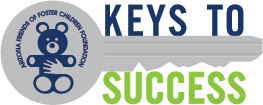In 2014 I was given the opportunity by Arizona Friends of Foster Children Foundation (AFFCF) to establish the Keys to Success program. For most of us, our earliest memories are of parents and family talking to us about our interests, skills, passions, and futures; about the importance of getting an education. As parents we help our children navigate getting their first job, making sure they get to and from work, supporting their growth to become good employees. Unfortunately, most young people in the foster care system have the opposite experience. No one is providing this guidance or support and every aspect of their lives is focused on surviving today – tomorrow is unfathomable.
Because of the instability in their lives, many youth in foster care have limited or a misinformed understanding of employment opportunities, and even fewer have had the support required to develop a vision for their future. The Keys to Success (KTS) program fills this gap by providing youth with the career planning, education, and employment development services that helps them to discover their potential and a pathway to successful adulthood. Perhaps sharing the journey of one program participant can best illustrate the impact of KTS on the lives of youth served:
Jillian was enrolled it the Keys to Success program in 2016. She was 16 years old and had spent most of her life in and out of foster care as a result of her mother’s long time struggle with mental health and substance abuse issues. Jillian had recently been placed with a foster family, but they were struggling to meet the needs of 6 other children in their home. Jillian was a bright and motivated student, but due to all the transience in her life she was a year behind her peers in school and failing math. Her KTS career development specialist stepped in and advocated extensively for her to get the support from the school she required to get on track for graduation, as well as the intensive, individualized tutoring she required through funding provided by AFFCF. Jillian also received help from KTS to gain employment at a local grocery store, where she worked all through high school. Jillian was on track to graduate in two months when her family decided she could no longer reside with them. If she had had to transfer schools and not graduate that may have been the end of this story. However, KTS reached out to partner organization Foster Arizona and they found her an amazing host family who took her in and got her to and from school for the remainder of that year. After she graduated she was able to move into the newly formed Foster Arizona Housing Program (FAHP), and KTS assisted her in enrolling at Mesa Community College, apply for and secure funding for her education, and get a job at a photography studio. Jillian currently serves as a member of the Keys to Success Youth Leadership Advisory Board and in this role is developing skills to become an advocate for other youth in the foster care system, while assisting with the development of the program. Jillian plans to transfer to Arizona State University after securing her Associate’s degree, has now moved into her own apartment, and is working at Allstate Insurance company earning $15.00 an hour! Without the intervention of KTS and Foster AZ, this story may have been very different. Jillian would most likely have become yet another statistic – a high school dropout, unemployed, homeless, and dependent on one or more public welfare systems. But thanks to her involvement in KTS and Foster AZ, today she has a promising future ahead of her full of opportunity.
Each year, approximately 900 youth leave the Arizona foster care system at age 18, with no connection to family or community. Without a supportive network, their chances of success in adulthood weaken. Research indicates that youth who emancipate from foster care experience poor outcomes such as homelessness, unemployment, unplanned pregnancy, low educational attainment, legal system involvement, and substance abuse. Changes in foster care placement frequently result in change in school placement, which sets them back both academically and socially as they deal with record transfer issues, different curricula, and new teachers and friends. Many of these youth fall behind and stay behind throughout their educational careers. Sixty-five percent (65%) of foster youth experience seven or more school changes from elementary through high school. A recent study indicates that the graduation rate among students in foster care is just 33%. Education often falters or ceases for foster youth on the road to self-sufficiency, with predictable outcomes in decreased standard of living. As young adults, many continue to struggle to be self-sufficient and are more likely to experience economic hardship, more likely to receive government benefits, and less likely to have basic assets such as a bank account or a car. National reports state at age 19, 60% of former foster youth are unemployed. Transitioning foster youth clearly have unique and significant educational, employment, housing, independent living needs. KTS has been developed to be a resource to insure youth transitioning from foster care have the support and resources required to meet their potential and become thriving members of our community.
Diane Daily
AFFCF Keys to Success Program Director
Readers can contact me by phone or email to follow up; ddaily@affcf.org or Office (602) 252-9445
